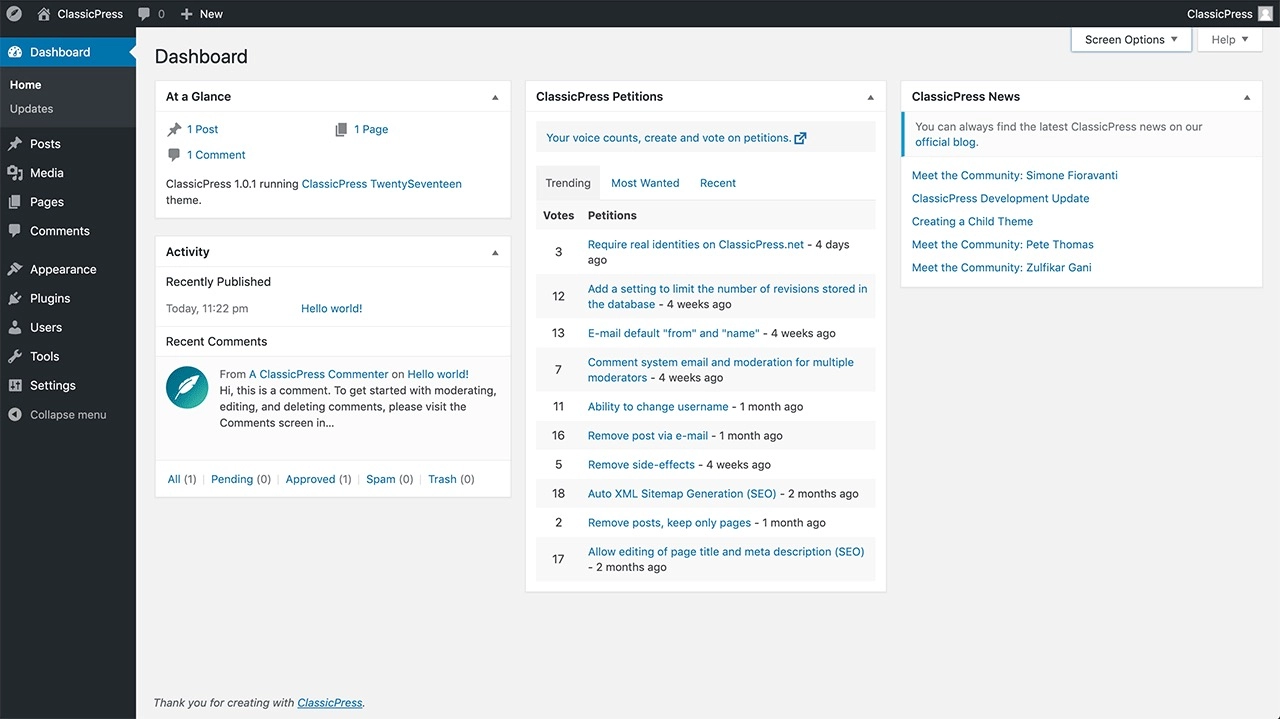If you've been in the web development space for more than a few years, you've probably noticed WordPress's dramatic shift toward the block editor (Gutenberg). While many welcome this change, a significant portion of the developer community longs for the simplicity of the classic editing experience. Enter ClassicPress - a WordPress fork that promises to bring back the classic workflow while maintaining modern functionality.

What Exactly is ClassicPress?
ClassicPress is a community-driven, open-source content management system that bills itself as "The CMS for Creators." It forked from WordPress 4.9 but has since rebased on newer WordPress versions while maintaining the classic TinyMCE editor as its default editing experience.
The project is managed by the ClassicPress Initiative, a non-profit organization, and has positioned itself as a lightweight, stable alternative to WordPress for those who prefer traditional content editing workflows.
Official Website: https://www.classicpress.net/
Installation Process
Getting started with ClassicPress is straightforward:
- Server Requirements: PHP ≥ 5.6, MySQL ≥ 5.0 or MariaDB ≥ 10.0, Apache/Nginx
- Download: Clone from GitHub or download directly from the website
- Database Setup: Create a MySQL database and user
- Run Installer: Upload files to your server and run the installation script
For migrating existing WordPress sites, the community provides dedicated migration plugins to simplify the process.
Can ClassicPress Really Replace WordPress?
The answer is: it depends on your specific needs.
When ClassicPress Shines:
- You prefer the classic TinyMCE editor over Gutenberg
- Performance and lightweight footprint are priorities
- You don't need WordPress 5.0+ features
- Your essential plugins/themes work with ClassicPress
When to Stick with WordPress:
- Your workflow depends on Gutenberg and its ecosystem
- You need plugins/themes that require WordPress' latest APIs
- You value access to WordPress' massive plugin ecosystem
- You rely on WordPress' extensive official support resources
Technical Comparison: ClassicPress vs WordPress
| Feature | ClassicPress | WordPress |
|---|---|---|
| Core Philosophy | Stability, lightweight, backward compatibility | Continuous innovation with Gutenberg integration |
| Default Editor | TinyMCE classic editor | Gutenberg block editor |
| Codebase Size | Approximately 50% smaller | Larger, more features |
| Performance | Optimized, faster page loads | Feature-rich but potentially bloated |
| Security | Reduced attack surface, security audits | Larger target, strong security team |
| Compatibility | Good with older plugins/themes | Extensive plugin/theme ecosystem |
| Learning Curve | Easier for traditional users | Steeper with block editor |
| Community | Smaller, focused community | Massive global community |
| Update Strategy | Stability-focused, backward compatible | Regular new features, possible breaks |
Real-World Use Cases Where ClassicPress Excels
Based on developer feedback and community discussions, ClassicPress works particularly well for:
- Personal Blogs: Especially for writers who prefer the classic editing experience
- Business Websites: Companies needing stable, efficient content management
- Small E-commerce Sites: When combined with compatible e-commerce plugins
- Community Websites: Forums and membership sites where simplicity is valued
The Honest Truth: Pros and Cons
Advantages:
- Lightweight and efficient: Smaller footprint, better performance
- Familiar editing experience: No Gutenberg learning curve
- Greater stability: Fewer breaking changes
- Potentially more secure: Reduced attack surface
- Focused community: Dedicated to specific needs
Drawbacks:
- Plugin/theme compatibility issues: Especially with newer WordPress extensions
- Smaller community: Fewer resources and support options
- Missing latest WordPress features: Lags behind in new functionality
- Uncertain future: Project has faced leadership challenges
The Bottom Line for Developers
ClassicPress presents a legitimate alternative for specific use cases but isn't for everyone.
If you value the classic editing experience, prioritize performance and stability, and your essential tools work with ClassicPress, it's worth serious consideration. This is particularly true if you believe WordPress has become overly complex for your needs.
However, if you depend on the Gutenberg ecosystem, need access to the latest plugins and themes, or value WordPress' massive community support, sticking with WordPress is probably the safer choice.
Recommendation: Before committing, set up a test environment and verify that your must-have plugins and themes work correctly with ClassicPress. The migration process is reversible, but better to avoid surprises in production.


Comments NOTHING